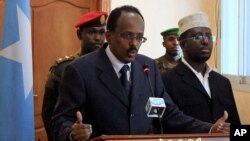About a year ago, New York State bureaucrat Mohamed Abdullahi Mohamed received an invitation to visit Mogadishu, the capital of his native Somalia. He’d been away for more than 20 years, but upon his return, he was offered the job of prime minister. Feeling an obligation to help his homeland, he accepted, despite having few political qualifications and little idea of what lay ahead.
Last January, a weary Mohamed Abdullahi Mohamed appeared in front of the United Nations for the first time. As prime minister of a country that has suffered two decades of civil war, he was pressed on how he could stop the spread of terrorism in Somalia or the pirates that prowl along its shores.
“I have been in office for, as a matter of fact, forty-nine days as of today," he said. "And we have been in preparation to strategize when and how we’re going to face our enemies.”
Just three months earlier, Mohamed was in a different office - at his desk at the New York Department of Transportation in downtown Buffalo.
“Until I get a call from Mogadishu to come for an interview with the president," said Mohamed. "Honestly when I went there, I wasn’t thinking I’d be the next prime minister.”
Mohamed’s appointment was a complete surprise, says Somalia scholar Ken Menkhaus, a political science professor at Davidson College in North Carolina.
“Well, my first reaction was to look him up and to learn more about who he was,” he said.
What Menkhaus found was a mild-mannered and soft spoken 48-year old who, despite activism in his local refugee community, was hardly a natural statesman.
Mohamed’s sudden rise to power came after a chance introduction to Somalia’s President Sheikh Sharif Sheikh Ahmed during his 2009 visit to the United States. Less than a month later, Mohamed was Prime Minister.
And instantly, Menkhaus says, Mohamed’s life was in danger.
"It’s very risky to be in Mogadishu and associated with the government right now," said Menkhaus. "The jihadist movement has used assassination as its principal tools of intimidation. There have been quite a few individuals associated with the government who have been killed.”
This was a far cry from Mohamed’s staid life in the suburbs of Buffalo, New York, where he lives with his wife and four young children.
“Bullets reached my office on many occasions," said Mohamed. "That’s normal. That was normal.”
Despite those risks, Mohamed worked 15-hour days, selected a cabinet that earned international praise, and won some early victories. For the first time in years, he made sure that Somali government soldiers received a salary.
That move has been credited for reduced defections to rebels, he says, and resulted in key military victories.
Mohamed says he drew on his experience in U.S. state government to try to change the culture of Somalia’s notoriously corrupt and dysfunctional system.
“I wanted to bring the good things I learned from here to Somalia," he said. "Everybody should work from 9 to 5 and get paid. And to earn honest living. To work hard. And to be honest.”
His methods made him popular with Somalis. But just nine months into his term, Mohamed was pressured to resign by the speaker of the parliament and the president, because he opposed their plan to delay elections. That ignited protests on the streets of Mogadishu, and among refugee communities in Toronto and London.
In Mogadishu, crowds chanted Mohamed’s nickname “Farmajo” while he rolled by in a tank, pumping his fist.
“I could see their emotion was very, very high," he said. "They were chanting 'Hagulesto Farmajo' meaning ‘Stay in office. You will ultimately prevail.’”
But he didn’t, eventually stepping down, he says, so the government could focus on the country’s growing famine.
Thousands of Somalis have died this year because of malnutrition, and hundreds of thousands have fled their homes for camps around Mogadishu or in Kenya and Ethiopia.
Ken Menkhaus says Mohamed was on the right track and did not deserve his swift dismissal.
“He emerged as a symbol of everything that Somalis are frustrated with. That there are people of good will, like him, who are trying to do the right thing in Somalia," he said. "And they are constantly being sacrificed on the altar of political calculations.”
Today, Mohamed is back at his old job at New York’s Department of Transportation. As a regional compliance specialist, he makes sure minorities receive a fair share of contracts. He says working in this position has some similarities to serving as a head of government.
“But no job will train you or give you experience to do that kind of work," said Mohamed. "Yeah, two different titles. One, you are heading a nation, and the other one, you’re a bureaucrat and civil servant. But both jobs basically is to help people.”
On Mohamed’s first day back, his co-workers welcomed him with cake and a small party. They also decorated his cubicle with pictures they found online of him posing with other world leaders.




